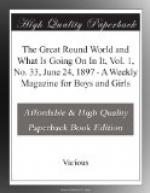It is his idea that the Government should be kept well informed of the places where colonists and laborers are needed, and when people come out seeking work, they should be sent to those sections of the country where work is waiting for those who want it.
Every ship brings out families of rough peasants seeking a home and a living in the new country. Very few of them have friends in the places to which they are going, and hardly any know whether it will be possible for them to obtain work when they arrive at their journey’s end.
Dr. Senner thinks these people should be directed to go where colonists are needed, and where their industry will have a chance of bringing in its reward.
Under the present system the immigrants are allowed to go where they will, and they crowd into the over-filled towns by thousands, and fail to make livings there, while enormous tracts of fertile land lie waiting for hands to come and till it, and make it yield up its bounties.
* * * * *
While we are speaking of immigration you will perhaps be interested to hear of a fresh race of people who have just begun to emigrate to America. The very first of these people passed through New York last week, on their way to Winnipeg, Canada, where the British Government has given them a large grant of land.
These peasants are the Russniaks or Ruthenians.
They are a people who dwell in Southern Austria and Southeastern Poland, where these countries join Russia. They really belong to the family of people who live in that part of Southern Russia which is called Little Russia, and they speak the language of this district, which is known as Little Russian.
These Russniaks are not little Russians in appearance. They are in fact a race of giants. In the party that came over none of the men were less than six feet tall, and two or three of them were more than seven feet in height. The women were also very tall and fine looking.
The party consisted of nine men, ten women, and twenty-five children. One of the number who could speak a little German said that they were farmers and goatherds, and had come out to Canada on the advice of a British agent, who promised them that they would be able to earn lots of money and be free from taxes in Winnipeg.
The dress of these people was very picturesque.
Both men and women wore sheepskin coats, made with the hair inside, and laced down the front with leathern thongs. Both wore rough hide boots, the men having the tops of theirs turned down and covered with handsome embroidery.
The women and children had white homespun linen skirts, embroidered at the edges, and the men had trousers of the same material.
Neither women nor children had any stockings, and the children had their arms and heads bare, as well as their legs.
Each man wore a wide, beautifully embroidered belt, from which hung a long sheath-knife and two or three pouches made of skin, which held food, water, and tobacco. On their heads the men wore broad straw hats with cock’s feathers stuck at the side.




